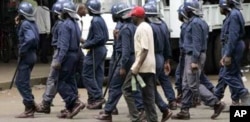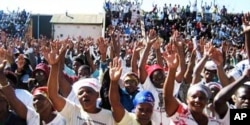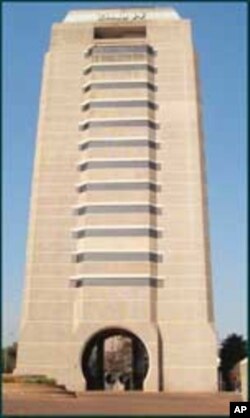Analysts say “gaps” in new South African immigration regulations place many thousands of “vulnerable” Zimbabwean migrants – including torture victims, survivors of massacres, the disabled, informal traders and unaccompanied children – at risk of deportation.
The government of South Africa says Zimbabweans living in the country can apply for new four-year residence permits by December 31. Those found by the authorities to be working, studying or owning businesses in South Africa will be allowed to remain; the rest will be expelled, according to the country’s immigration chief and a deputy director general of Home Affairs, Jackie McKay.
The International Organization for Migration says there are up to two million Zimbabweans living illegally in Africa’s most powerful economy, but some NGOs say the number is much higher. Zimbabweans have been flooding into South Africa for the past decade because of political violence and economic meltdown in their homeland.
Zimbabwe now ‘stable’
South African cabinet spokesman, Themba Maseko, says the decision to “regularize” Zimbabweans is based on “some stability” that’s returned to Zimbabwe since ZANU-PF and the Movement for Democratic Change (MDC) formed a unity government almost two years ago.
But Zimbabwean and South African human rights activist and academic, Elinor Sisulu, says the South African authorities’ “failure” to acknowledge the ongoing political and economic instability in Zimbabwe represents a “huge gap” in their drive to document the migrants.
“It’s a decision based on the fiction that financial security for the majority of Zimbabweans has improved in Zimbabwe and that security for human beings has improved. It’s based on this fiction that people can return to Zimbabwe and live happily ever after,” she comments.
Analysts say another indication of the South African government’s belief that Zimbabwe is now stable enough for exiles to return is its decision that only Zimbabweans who entered South Africa before May 31, 2010, are allowed to apply for the new residence permits. Those who came to the country after that date face expulsion.
“One of the key problems with the current South African plan is that it has this completely arbitrary cut-off date,” says Tara Polzer, of the Forced Migration Studies Program at Johannesburg’s Wits University. “That date is motivated by the attitude that after that, people didn’t really have that many reasons to leave Zimbabwe. That doesn’t make any sense to me.”
Lawyer and director of the Zimbabwe Exiles Forum, Gabriel Shumba, says political violence endures in Zimbabwe, and he’s “at a loss” to understand why the drafters of the revised immigration rules “won’t recognize this.”
He states, “ZANU-PF continues to kill people. They recently killed a man at a meeting in Harare where a new constitution was being discussed. If that can happen during a mere constitutional reform exercise, (what will happen) when we hold our elections next year? Clearly the situation has not improved.”
‘Marginalized’ Zimbabweans ‘isolated’
Analysts agree the new ordinances put the majority of Zimbabweans in South Africa at risk of deportation, as the rules only accommodate migrants the government decides are helping to “develop” South Africa.
“They are saying very explicitly, ‘We are welcoming Zimbabweans who have already proven that they are a value to society. And everybody who can’t prove that, because they’ve been here without working etcetera, they should go home,’” says Polzer.
Shumba emphasizes, “The new South African policy is clearly designed to rid the country of economic migrants.”
South Africa’s Deputy Home Affairs Minister, Malusi Gigaba, has confirmed to the Mail and Guardian newspaper that the new policy is partly designed to separate economic migrants from “genuine” asylum seekers.
“It’s unfortunate and it’s not a humane solution and it’s not a practical solution…. It causes a lot of suffering for people,” says Sisulu.
“The requirements for the new permits unfortunately do isolate the more marginalized Zimbabweans living here. There are (for example) blind women that depend on handouts to survive,” says Zimbabwean-born Braam Hanekom, who heads Cape Town-based refugee rights group, PASSOP. “For those who fled (Zimbabwe) because they cannot survive there, because they are starving (there), we also believe that there must be an obligation to assist them because they will die from starvation if nothing else when they go home.”
Shumba adds, “There are many Zimbabweans here who are disabled, and unaccompanied children whose parents sent them here to friends. These people also don’t qualify for the permits.”
Hanekom maintains the new rules “ignore refugee Zimbabweans, the truly destitute, who will be most at risk if they were to be deported. The question that should be posed to them (by South Africa’s government), from a humanitarian perspective, is ‘What kind of protection do you need from us?’ Instead, what these new regulations ask is, ‘What positive contribution are you making to (South Africa)?’”
Polzer says there’s a “sub-group” of Zimbabweans in South Africa who are here “essentially for humanitarian reasons…the poorest people, who are here because they can’t get proper health care in Zimbabwe and have lost the ability to feed themselves and their families back in Zimbabwe and who don’t have the ability or skill to turn themselves around once they get here.”
She says these migrants will be “extremely vulnerable” if they’re sent back to Zimbabwe. Hanekom explains, “We are trying to reason with Home Affairs to somehow accommodate the vulnerable groups of Zimbabweans, otherwise they are just going to be packed off to Zimbabwe, where they face minimal support and perhaps even ultimately death.”
Refugees could be expelled
While human rights organizations agree that most Zimbabweans presently in South Africa are here to work and gain income for their families, they maintain there are many here who’ve suffered intense political persecution back in Zimbabwe.
“I know many who have been assaulted, almost killed, and locked in police cells to be tortured in the most horrible ways imaginable,” says Shumba. “These people are not working or owning businesses or studying at colleges here; they are hiding. But if they fill out ‘hiding in fear of life’ on a form, the South African government could kick them out in terms of the new policy.”
Sisulu’s concerned that Zimbabweans who fled to South Africa after the Zimbabwe government launched Operation Murambatsvina (Restore Order) in 2005 will soon be deported. The Harare authorities branded the operation a “clean up” of “dirty, crime-ridden” districts in Zimbabwe, but human rights organizations say it was a coordinated attack on areas deemed to be anti-government.
“The people who were affected by Operation Murambatsvina are really a tragedy in the region. Many of these people have nothing; they aren’t working or studying and therefore they are excluded from the new permits,” Sisulu explains. “The South African government is just one of many that do not recognize them as refugees, even though the reason their livelihood was destroyed in Zimbabwe was political. It was a political attack on those people.”
The MDC chairman in South Africa, Austin Moyo, also points out that “a special category” of Zimbabweans who sought refuge in South Africa during and after the so-called Matabeleland massacres could be deported, in terms of the new South African regulations. In the early 1980s, Mr. Mugabe’s security forces allegedly killed thousands of Zimbabweans from the Ndebele ethnic group, the perceived opponents of the Shona president.
“That’s another category that has not been properly catered for. How are they going to be regularized in South Africa?” Moyo asks. Sisulu says, “There is this sense that these people are being thrown to the wolves.”
Asylum chaos
Immigration chief Jackie McKay insists the South African government “is not blind to the suffering” of Zimbabwean migrants. “This new project does not take away their right to apply for asylum in South Africa…. If they are successful, they can stay,” he says.
But people who’ve studied South Africa’s asylum system say McKay’s suggestion is impractical, given his government’s rejection of the majority of applications for refugee status from Zimbabweans thus far.
“The South African asylum system is in many ways extremely dysfunctional. The vast, vast, vast majority of Zimbabweans have simply been rejected out of it. Even for people who have experienced torture, for example, we’ve had a lot of cases of people being rejected out of the asylum system,” says Polzer.
Records at South Africa’s Department of Home Affairs reveal it has granted asylum to only 5, 815 Zimbabweans in the last eight years. Home Affairs officials, who requested anonymity, confirmed that the department faces a backlog of more than 100,000 applications for refugee status.
“We’re afraid that come next year, South Africa will deport true refugees back to a country where terrible things could happen to them. Is that the way a humanitarian government behaves?” Hanekom asks.
Informal traders in jeopardy
According to McKay, even Zimbabwean hawkers currently selling fruits and vegetables and loose sweets on street corners could qualify for the new business permits allowing them to remain in South Africa. But Moyo says “in practice,” this isn’t going to happen.
“That category of people, their businesses are not properly registered. So these people have been left out (of the new system) and they are actually destined to be deported,” the MDC official says.
McKay confirms informal traders will only be issued with business permits “if they can produce proof of registration of their company with the registrar of companies and with the South African (tax authorities)” and a valid Zimbabwean passport.
Shumba says these requirements will effectively allow the South African government to expel most Zimbabwean hawkers next year, as “it is unlikely (the traders) will be able to navigate these complex processes in time to apply for the legal papers before December 31st.”
But McKay says, “We believe we have worked out a system that accommodates Zimbabweans here as best we can…. To all those people who miss out on this project and cannot remain in South Africa, we are sorry.”
Shumba’s convinced that Zimbabwean migrants who are denied the new residence papers “will continue to play hide and seek” with South African security authorities as they try desperately to stay in the country. “Many people will carry on obtaining residence documents fraudulently in order to sustain themselves and their families in Zimbabwe,” the lawyer says.
McKay responds that if the migrants break the law beginning next year, they’ll suffer a fate “worse” than deportation, because of increasingly stricter immigration legislation. He says, “Any person found in the possession of fraudulently obtained South African (identity) documentation, and therefore guilty of identity theft, will be imprisoned without the option of a fine for 20 years.”








